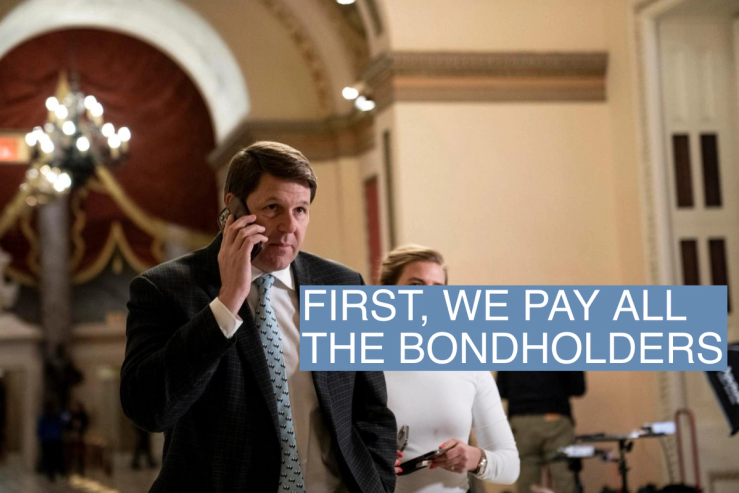The News

Republicans have been talking up an old idea to prevent a catastrophic default should Washington breach the debt ceiling later this year.
If the government suddenly can’t cover all of its bills, some GOP lawmakers argue it should simply pick and choose who to pay each day, and put bondholders first on the list, followed by other key groups like retirees.
Last week, Sen. Rick Scott, R-Fla. released a bill that would require the government to keep making payments on Treasury bonds, Social Security benefits, military salaries, and veterans benefits in the event of a debt limit breach. In a statement to Semafor, Scott said the legislation would ensure the U.S. “takes care of its core obligations” while giving lawmakers the “limited time they may need to solve the problems before us.”
Rep. Jodey Arrington, the GOP chair of the House Budget panel, recently went even further, arguing that the US already has a constitutional obligation to pay bondholders first under the 14th amendment, which says the “validity of the public debt … shall not be questioned.”
“We have to pay our creditors,” he told Punchbowl News in an interview published Friday. “Like, you can’t not do that.”
Conservatives have pitched “debt prioritization” as a potential fallback plan during every borrowing limit showdown of the past dozen years. By ensuring bondholders are paid, they argue, they can turn a prolonged standoff into something closer to a government shutdown — a major inconvenience, but not the kind of thing that explodes the entire global financial system. That would make it easier for GOP leadership to hold strong in negotiations.
Democrats have criticized it as an impractical and potentially illegal band-aid that wouldn’t prevent economic calamity. Treasury Secretary Janet Yellen said last week that prioritizing bondholders would still amount to a default. (Trump’s Treasury chief, Steve Mnuchin, also wasn’t a fan.)
Some top Republicans in Congress have quietly been wary of the proposal, too.
“After looking at it, we came to the conclusion in the McConnell operation this doesn’t work — and there are essentially some political downsides to it,” Rohit Kumar, who worked as a senior aide to Senate Minority Leader Mitch McConnell during the 2011 and 2013 debt ceiling standoffs, and is now PwC’s national tax services co-leader, told Semafor.
But for the moment, Wall Street seems to be taking comfort in the notion that should debt ceiling negotiations go off the rails on Capitol Hill, their interest payments will keep arriving on time.
“Most investors who follow this closely are very aware the United States will not default on its bonds,” Ajay Rajadhyaksha, global chair of research at Barclays, told Politico this week.
In this article:
Joseph’s view
There are good reasons much of Washington is skeptical of prioritization. Even if it’s feasible — a big if — it would still entail catastrophic economic damage.
Without the ability to borrow for deficit spending, the government would have to immediately cut 18 to 25 percent of its outlays, Marc Goldwein, senior policy director at the Committee for a Responsible Federal Budget, told Semafor.
Even if Social Security were protected, vast swaths of the safety net — Medicaid, food stamps, housing vouchers — would also cease to function as normal. “The hit to the economy as these government spending cuts cascade through the economy would be overwhelming,” a report by Moody’s Analytics warns.
Choosing among the government’s 80 million or so daily payments would also pose major logistical challenges.
Paying bondholders would be the relatively simple part, Joseph Wang, a former senior Fed trader on its open markets desk, told Semafor. The U.S. could continue making principal and interest payments on the national debt through the Federal Reserve Bank of New York — as long as enough cash was on hand. A Fed transcript from 2011 showed that officials there crafted a plan with the Treasury Department to do just that.
“The way that the Fed works from my experience is that it’s very conservative and so it wants to have these Plan Bs in place,” Wang said. “I think they will probably have the capability to do that.”
Making sure Social Security and veterans benefits keep landing on time could be harder. It’s unclear that the government has the technical capacity to prioritize among its payments for obligations other than debt, which are handled on a separate computer system at Treasury that ordinarily schedules them to go out as orders arrive.
At minimum, it’d involve some heavy manual lifting to reprogram software that was never intended to make some payments and not others. “I don’t think it’s easy to do,” William English, a former top Federal Reserve official and now a finance professor at Yale University, told Semafor. He added that there was room for human error.
Brian Riedl, an economist at the right-leaning Manhattan Institute, studied the issue in-depth as a staffer in former GOP Sen. Rob Portman’s office and also warned prioritization would strain Treasury’s technology.
“They receive millions of invoices every week to produce millions of payments and they’re generally paid sequentially and they can’t be categorized very easily into Social Security gets paid, TANF doesn’t get paid,” Riedl said, referring to Temporary Assistance for Needy Families. “They’re just not programmed to do that.”
Tax revenue is also deposited unevenly, meaning Treasury would be inclined to conserve cash to keep paying bondholders as scheduled, even if it had enough at any given moment to finance other obligations like checks to retirees or salaries for federal employees and the US military.
A bill like Scott’s is also “politically dangerous,” Riedl said, because Democrats would be able to appeal to beneficiaries of every program that didn’t make the cut in order to build pressure for a deal.
“Chinese bondholders get paid before school lunches. Chinese bondholders get paid before border security,” Riedl said. “The attack ads write themselves.”
Room for Disagreement
GOP Sen. Kevin Cramer of North Dakota is one of the six Republican co-sponsors of Scott’s bill and strongly supports the idea of itemizing the federal government’s priorities. “Why wouldn’t you have a priority list? That’s what everybody that can only spend what they take in every day does at their homes and in their businesses,” he told Semafor last week. “I think the reluctance is, if somebody comes up with a plan that makes sense for too many voters, they might opt for that.”
Correction
This article originally stated that Sen. Kevin Cramer is from South Dakota.

